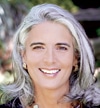by Maria Sirois
“Use your life to illuminate something larger.”
—Phyllis Theroux
A colleague asked me an unusual question last week, “What do I do with the guilt of having done so well when the rest of my family struggles?” He referred to “doing well” as financial security and a stable, healthy family, but he could have been speaking to any number of the elements of guilt present in us when life treats us well: better homes, healthier bodies, less illness, less struggle, less dying. And in a funky way, his question felt like the flip side of a question I am asked far more often: “Why me? Why this much suffering?” I suggested to my friend the same thing I have suggested to those who become caught in the “why me” whirlpool; both questions, I responded, come from the wrong end of inquiry.
The “wrong end” are those questions that lead us into closed alleys, separating us from the wholeness of life and others. They stand in contrast to questions that expand and enhance our humanity, and bring us to a place of largeness within ourselves. Whether we are in pain or in states of joy, we ought be looking for the questions that bring us closer to that which enlivens us and brings us to a place of resonance with life itself. We ought to attempt to quiet any questions, however normal and natural they are, that keep us believing that we are special and therefore distinct and lead to a splitting away from others. “Why me?” either as a query about why so much crap has come my way, or why so much goodness has come my way, tends to inherently keep us apart.
I prefer a different inquiry.
I have come to favor thinking that grounds and soothes me, lifting me while honoring both the depth of my pain and the breadth of abundance that has appeared.
For now at least, I’ve buried the “Why me?” question right next to “How come?” and “What’s the point?” Let the dogs dig for them or the weasels hunt for the slight marrow in their bones. I have found them an unsatisfactory gnawing; a meager meal. I turn instead to the thinking of the wisdom traditions of the east and the Tibetan Bon reflections on the nature of suffering and abundance, thinking that orders itself like this:
Suffering is.
Abundance is.
When, why, and how they appear is mostly a mystery.
They simply are.
Better to focus on how we receive them and what we do with them, than on why they showed up in the first place.
We are back to choice then, and the notion that a part of what comes our way is ours to craft, to shape, to mold in some way … either toward the benefit of ourselves and others … or not. We might, the Tibetans suggest, hold our suffering as if it were precious, for in recognizing our pain we are given the opportunity to grow into compassion for the pain of others. We might then, too, hold the goodness and abundance that has come our way as precious, for as we do so, we model for others the opportunity to savor that which is good, and so that we may be full and nourished when misery appears another time; which it will unpredictably, capriciously and certainly.
None of these grand perspectives may be evident at first or easy to hold onto. “In the hot pit,” says author Janet Elsbach, “I am not thinking broadly or generously, at least for a time.” Yet knowing of this possibility, having the language for a larger way of seeing can in and of itself trigger a shift of attention away from the “me” inherent in “Why me?” and toward the “us” inherent in “How do I use this well?”
Even this great goodness, we might find ourselves saying, I allow in and offer back to the world for the benefit of myself and others.
Even this pain, we might consider thinking, I recognize—from cognere, to know or to know again—so that I might be softened toward compassion for others.
This post is excerpted from A Short Course in Happiness After Loss (And Other Dark, Difficult Times).
Learn more from Maria in her upcoming WBI courses: The Resilient Quest (When Life Strikes Hard), beginning November 6; and Teaching for Transformation, beginning February 9, 2018.
Dr. Maria Sirois, PsyD, is the Vice President of Curriculum at Wholebeing Institute and an inspirational speaker, seminar leader, and author who has worked at the intersections of wellness, psychology, and spirituality for nearly 20 years. As a wellness guide, Maria has been invited to keynote throughout the country at conferences for wellness centers, hospitals, hospices, and philanthropy, business, academic, and corporate institutions, as well as for the general public. She has been called a “true teacher” and “an orator of great power and beauty.” She is the author of “A Short Course in Happiness After Loss (And Other Dark, Difficult Times)” and “Every Day Counts: Lessons in Love, Faith, and Resilience from Children Facing Illness”.











Loved this article, it makes total sense, as brothers and sisters we wonder why our siblings have had to suffer more than us or had a harder life, but as the article says…they become our example of compassion and strength